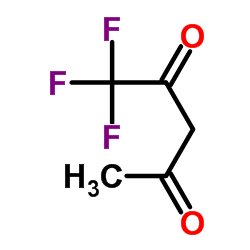Synthesis and anticancer activity evaluation of new 2-alkylcarbonyl and 2-benzoyl-3-trifluoromethyl-quinoxaline 1,4-di-N-oxide derivatives.
Belén Zarranz, Andrés Jaso, Ignacio Aldana, Antonio Monge
文献索引:Bioorg. Med. Chem. 12(13) , 3711-21, (2004)
全文:HTML全文
摘要
As a continuation of our research in quinoxaline 1,4-di-N-oxide and with the aim of obtaining new anticancer agents, which can improve the current chemotherapeutic treatments, new series of 2-alkylcarbonyl and 2-benzoyl-3-trifluoromethylquinoxaline 1,4-di-N-oxide derivatives have been synthesized and evaluated for in vitro antitumor activity against a 3-cell line panel, consisting of MCF7 (breast), NCI-H460 (lung), and SF-268 (CNS). These active compounds were then evaluated in the full panel of 60 human tumor cell lines derived from nine cancer cell types. The results have shown that, in general, anticancer activity depends on the substituents in the carbonyl group, improving in the order: ethyl
相关化合物
| 结构式 | 名称/CAS号 | 分子式 | 全部文献 |
|---|---|---|---|
 |
1,1,1-三氟乙酰丙酮
CAS:367-57-7 |
C5H5F3O2 |
|
Inhibition by diacylmethane derivatives of mutagenicity in S...
1991-03-01 [Mutat. Res. 262(3) , 189-93, (1991)] |
|
Inhibition by diacylmethane derivatives of mutagenicity and ...
1989-11-15 [J. Natl. Cancer Inst. 81(22) , 1743-7, (1989)] |
|
Structure and vibrational assignment of the enol form of 1,1...
2006-10-01 [Spectrochim. Acta. A. Mol. Biomol. Spectrosc. 65(2) , 387-96, (2006)] |
|
Synthesis, Characterization, Spectral Studies, Antibacterial...
2015-01-01 [Acta Chim. Slov. 62 , 805-17, (2015)] |
|
Capillary gas chromatographic determination of putrescine an...
1999-02-19 [J. Chromatogr. B. Biomed. Sci. Appl. 723(1-2) , 17-24, (1999)] |